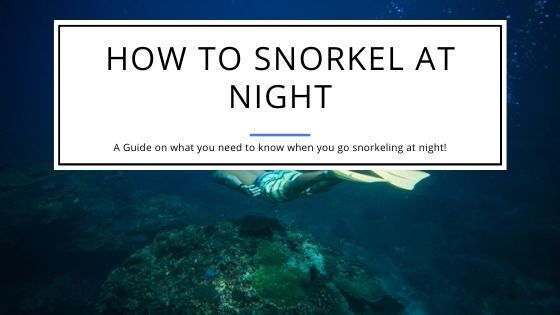How to Snorkel at Night – A Comprehensive Guide
While snorkeling is an activity that most people do during the day, some snorkelers like getting in the water after sundown. They are fascinated with the idea of seeing the ocean in the dark when going night snorkeling and observing all those sea creatures that remain hidden during the daytime.
However, it is slightly trickier to snorkel at night rather than during the day. We will help you cover the basics of nighttime snorkeling, including info on any special gear required, what to watch out for, and the best places for snorkeling at night (including tours).
Can You Snorkel at Night?
Yes, you can snorkel at night, and in fact, many people find it to be a more magical experience than snorkeling during the day. You get to observe creatures that only show themselves after dark and if you’re lucky, you will get to see the natural glow of bioluminescent plankton. If you go when the moon is shining, the entire experience when you go night snorkeling is all the more exhilarating.
That being said, snorkeling at night requires special gear and you’ll need a tour guide or snorkeling instructor the first time you snorkel at night.
Can You See Any Aquatic Life at Night?
Certain sea creatures come out of their hiding spots only at night. In fact, many sea creatures hunt for their food at night.
Although it may seem that the ocean is quiet, you just need to put your dive light to good use and look around a little behind rocks and among corals to find fish, octopus, and tiny shrimp with their beady little eyes.
Why Would You Snorkel at Night?
When the night falls, the ocean unleashes the beauty it conceals during the day. While at first glance it may seem like the rest of the world, the ocean is also asleep; you need to look a little closer. Shine your dive light around seemingly quiet rocks and corals and you will notice a hidden octopus, creeping out on the hunt.
Do You See Different Creatures at Night?
Many sea creatures come out at night to feed and are not visible during the day. Lobsters, eels, octopus, etc., are more active at night. Some of these creatures have reflective eyes that peer out at you from behind rocks and through curtain-like corals.
This brings us to our next point: corals look even more magnificent at night. While they remained closed up and insignificant during the day, at night they are in full bloom, showing off their bright colors, feeding and releasing eggs, and spawning.
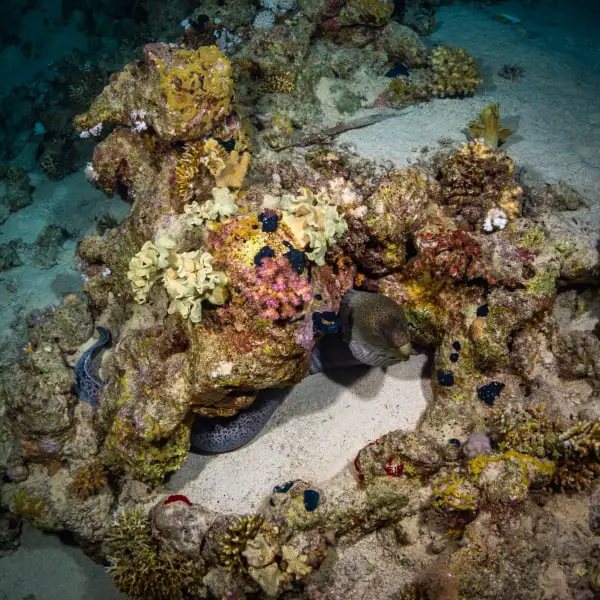
Have a look at our snorkeling fins reviews to find the best flippers for snorkeling!
What about Luminous Water Creatures?
If you turn your dive light off for a bit, you’re in for a real treat. With any luck, the waters you’re in will contain phosphorescent plankton that emits their own glow.
If you wiggle your arms and legs about, you may suddenly find yourself surrounded by tiny luminous specks. A fast-moving shoal of fish can also cause ripples in the water, making the plankton appear to be threads of light.
Do You Need Specific Equipment to Snorkel at Night?
Apart from your usual snorkel gear, such as a snorkel, snorkel mask and fins, you need some additional equipment, such as a dive light and a wetsuit.
Do You Need a Dive Light When Snorkeling at Night?
A waterproof flashlight (or dive light) is absolutely necessary if you’re snorkeling at night. If you’re just snorkeling at night as a once in a lifetime experience, you can rent a dive light (it costs roughly USD 10 or a bit more). It’s also a great way to save up on luggage space.
If you’re a frequent nighttime snorkeler or intend to become one, then owning your own dive light is the better, more cost-friendly option. Make sure your light has properly-functioning batteries that won’t run out any time soon before you get in the water.
Do You Have to Wear a Wetsuit When You Snorkel During the Night?
Apart from a dive light, the other main item required is a neoprene top. No, you don’t need a full wetsuit, but the material used for the top is the same and it provides a little extra warmth since the water is a bit cooler at night.
Do You Need a Whistle?
Keeping a whistle with you is a good idea because you can easily send out warning signals to your buddy or your tour boat. Don’t forget that night snorkeling or a night dive do not give you the luxury of daylight and you are not easily seen when floating on water.
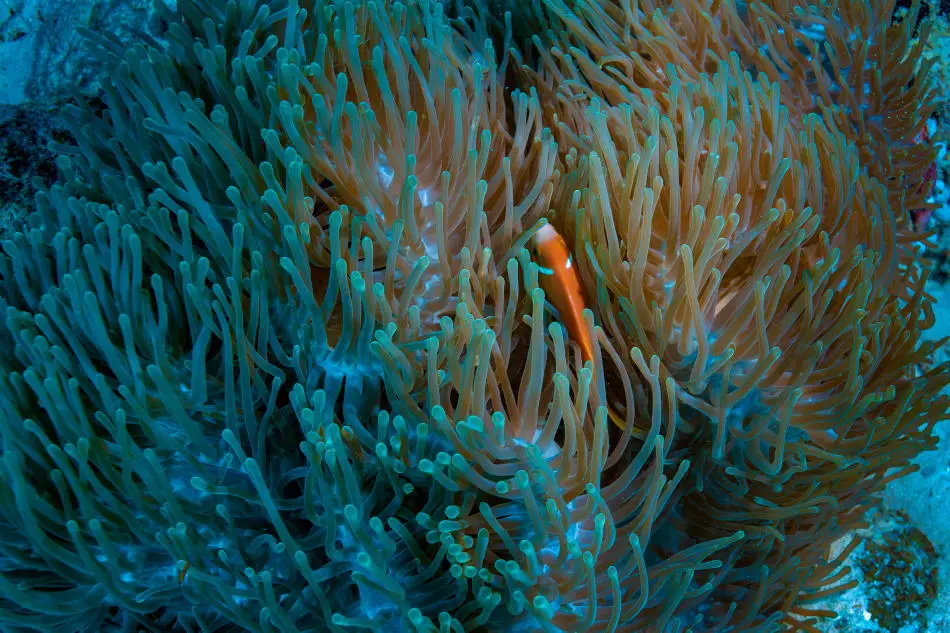
Is Snorkeling at Night Dangerous?
While snorkeling at night is not particularly dangerous, it is a bit harder than snorkeling during the day. You become a little more vulnerable in the water since your vision is restricted and you’re not really sure about what is lurking beneath the surface.
Do You Always Need a Buddy When Night Snorkeling?
It is highly recommended that you snorkel with a partner at all times, especially when night snorkeling. Apart from being your backstage crew when you’re filming underwater, they can also provide you with light if your torch dies and you need to find a way back to the shore. They can also help you out in case you have an emergency panic attack, etc.
Your buddy and you should also have a code, for instance, 2 flashes of the light for danger, etc. since hearing each other in the water may be difficult or impossible based on the situation you are in.
Are There More Predators Out at Night?
Many sea creatures are more active and hunt only during the night. However, they are unlikely to attack humans as long as they are not provoked.
Although shark attacks aren’t unheard of, they are extremely rare. The important thing to remember is to do your research on the area you plan on snorkeling in to find out about any dangerous species that might reside there.
How Do You Photograph or Make Videos During a Night Snorkel?
Since you will have a dive light with you, you can use it to help you record your snorkeling experience.
Do You Need a Special Camera?
You don’t really need a special nighttime camera, but if your pictures are coming out a little dim or blurred, set your camera to ISO 1600+ to improve the image quality. The slower your lens, the higher the ISO should be.
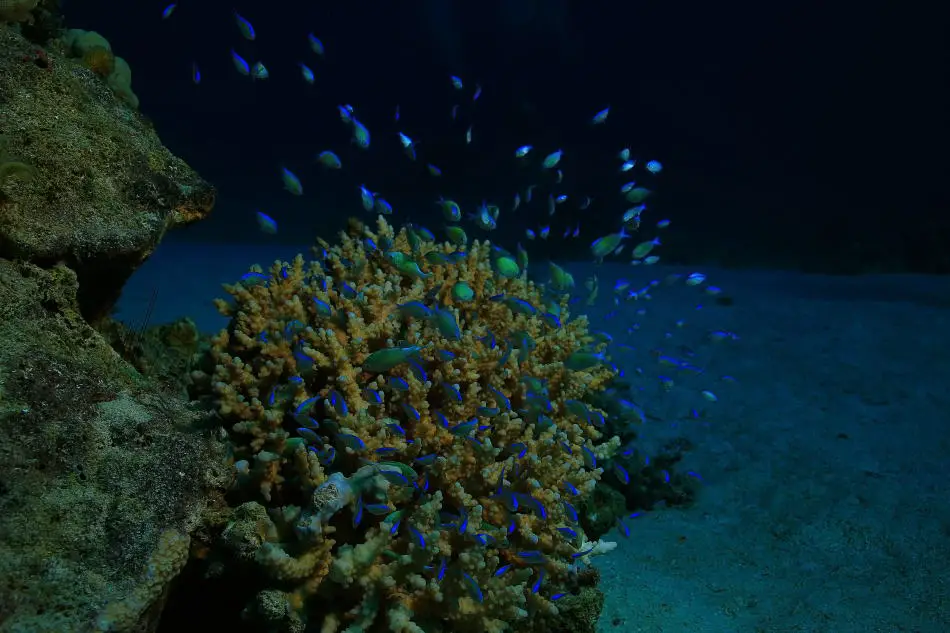
Remember that directing your flashlight beam on your target will result in a big white splash mark on your final picture. Shine your light slightly away from the intended animal (or corals, etc.) and you’ll get a better picture since your subject will be illuminated without having too much light on it. Your night snorkeling buddy can assist you by swiveling the light around until you get the right angle.
Using the camera flash is not a good idea for 2 reasons:
- Using a camera flash during your night snorkeling tour disturbs the ecosystem of the ocean.
- It illuminates the water particle and makes your picture hazy.
- The sudden bright light can reflect back from fish and water particles and your photo will be nothing else than a white flash.
Your dive light should be sufficient, but if you’re a professional who needs extremely high-quality pictures, you can find special lighting systems that work with underwater cameras.
Are There Night Snorkel Tours?
If you’re snorkeling at night for the first time, then it is a good idea to look for a guided tour. Certain locations offer tours near the coast or by boat.
These tours will provide you with plenty of light so you don’t miss anything and they’ll also be able to tell you where to look for hidden sea creatures and the types of sea creatures you are likely to encounter (something you are likely to miss out if you’re on your own). Once you’re used to being in the water at night, you can go snorkeling at night on your own.
What Are the Best Locations to Snorkel at Night?
The eerie silence and the pitch darkness of the ocean at night can feel a bit unsettling. Most people prefer to snorkel in areas that have streetlights nearby or in resort areas where there are hotel lights around the water.
Places with plenty of rocks and corals are ideal because you’ll find a lot of sea creatures scampering behind the rocks, and the corals will also be blooming.
Many people look for locations with calm, peaceful waters and locations where they’ve snorkeled before during the day so that they feel more comfortable in the water. Make sure you are familiar with the route you take so that it is easy to find your way back to the shore.
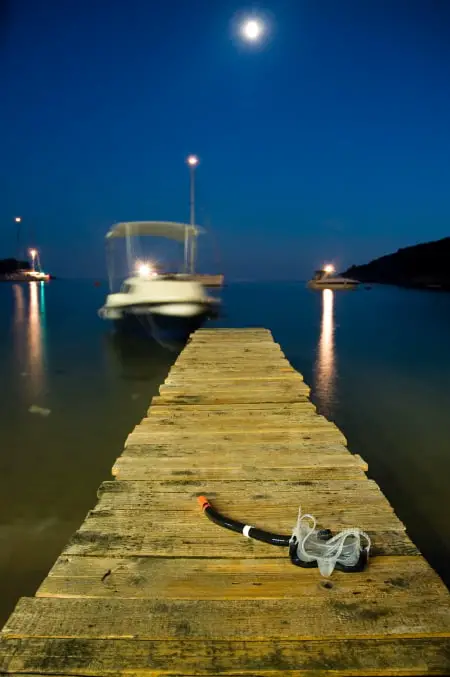
Special Night Snorkel Locations
Some places around the world offer unique snorkeling experiences, unlike anything you’ll see in your entire life. On the Big Island of Hawaii, you can snorkel at night with Manta Rays! These massive creatures have wings that are 8-16 feet long and they circle around you as you snorkel!
If you’re planning a trip to Hawaii, you don’t want to miss out on this experience so make sure you sign up for a tour in advance. The entire experience lasts for around 2-3 hours during which you get to observe manta rays swirling all around you.
You won’t be allowed to actually touch any of the mantas when night snorkeling, but don’t worry, they don’t eat humans. Their diet is mostly plankton.
Other places where you can go for a night snorkel include:
- The Maldives where some resorts even offer night snorkel “safaris” (although snorkeling in the Maldives will be quite expensive).
- Curacao where you can often catch a glimpse of turtles, even if you are snorkeling close to the shore.
- Maui where you can easily find night tours and you’ll get to see many animals, such as turtles, lobsters, and octopus.
- Florida Keys – you won’t see much near the shore, except maybe a few jellyfish, but if you go by boat and snorkel in the middle of the ocean, you can find some really cool sea creatures such as turtles, sharks, and even bioluminescent squid!
This list is by no means and exhaustive and if you live by the coast, you can easily find out if there are any night snorkel tours, etc.
Is It Worth It?
The incredible view of the ocean, the blooming colors of the corals and sea creatures shining out from the corners definitely make the experience worth it. In fact, for something as incredible as the Manta Ray sighting in Kona, Hawaii, people plan trips just for this.
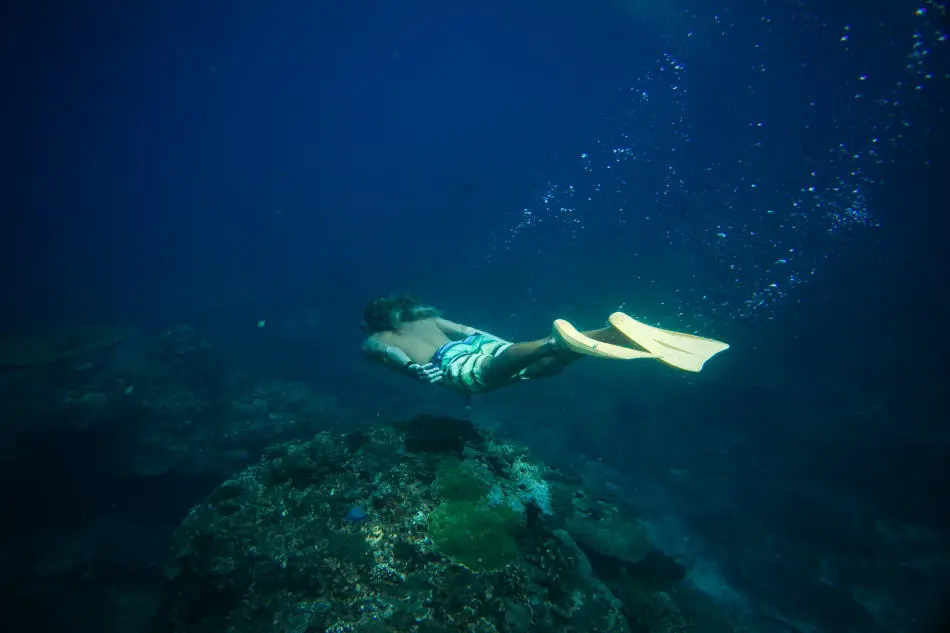
Final Thoughts
Snorkeling at night is a completely different experience from snorkeling during the daytime. Apart from needing special equipment, even if you’ve snorkeled in a particular place during the day, you won’t be able to see the resemblance at night.
Not only do you get to see different sea creatures, but you also get to see them at a time when there aren’t many people around so they won’t be hiding or scurrying away too much. If you’re lucky, you may even get to see bioluminescent plankton or fish.
Click here for more information on snorkeling and snorkel gear reviews!

